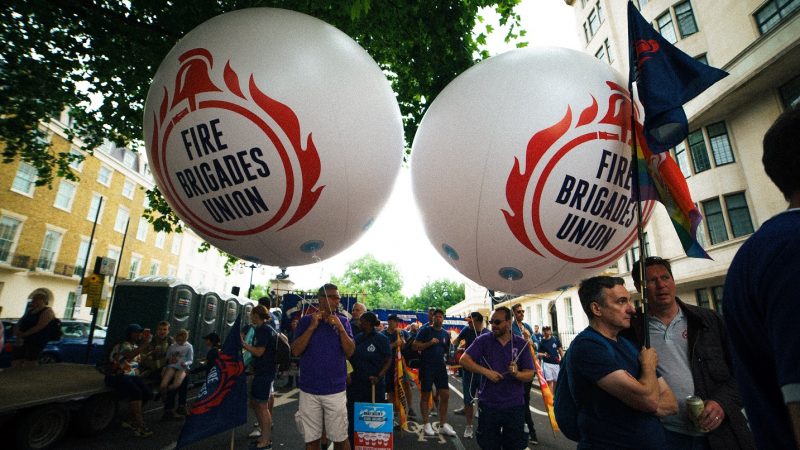Firefighters smash their ballot with overwhelming support for strike action.

Members of the Fire Brigades Union (FBU) have voted by a strong majority in favour of taking industrial action.
The strike ballot, which closed 30 January, had a decisive turnout of 73%, with an overwhelming 88% voting ‘yes’ to strike action.
Ballots in Northern Ireland and among control room staff in North West of England also delivered strong mandates, with a huge 94% of members voting in favour of action in Northern Ireland.
The FBU has given the government and employers a 10-day window to make an improved offer to members, in an effort to avert the strikes.
If strike action does go ahead it will be the first nation-wide fire strike over pay in two decades.
Ben Selby, Assistant General Secretary of the Fire Brigade Union, told LFF yesterday that the results came as no surprise amid wide-spread worker discontent.
“We have known for quite some time that firefighters are really angry about the pay offers we’ve had for the last 12 years, but particularly since the pandemic when we went over and above, like many public sector workers did, to keep this country safe and running,” said Selby.
“Firefighters are angry that they got offered 2% and then eventually 5% when inflation is soaring. So today’s result was a known, we know that firefighters are ready to fight back and today’s result shows that very firmly.”
FBU members rejected a below-inflation 5% pay offer in November last year, having already seen their salaries cut in real terms by £4,000 since 2009.
Accounts of firefighters using foodbanks to feed their families and struggling to pay their bills amid the cost-of-living crisis has highlighted the dire situation in which the key workers are operating.
As well as a real-terms pay cut, the fire industry has experienced severe funding cuts, with one-in-five frontline firefighter jobs lost since 2010.
In 2017 the fire and rescue services reported a 30% reduction to their central funding since 2010.
As a result, response times have slowed, putting extra pressure on the services, as well as increased risk to people’s lives.
The FBU also highlighted recent research which showed firefighters are significantly more likely to develop cancer than the general population.
Polling by YouGov shows the majority of the public, 58%, support firefighters taking strike action, as Matt Wrack, General Secretary of the FBU, accused the Prime Minster of badly misjudging the public mood.
Wrack said: “Our members risk their health and safety, and sometimes their lives, round the clock to keep people safe and serve their communities.
“However, with inflation and energy bills rocketing, they are now increasingly struggling to pay the bills or to afford the basics.
“This is an absolute last resort for our members. The responsibility for any disruption to services lies squarely with fire service employers and government ministers.
“Rishi Sunak’s government has refused to make funding available for a decent pay offer to firefighters and control staff.
“Firefighters were among Britain’s Covid heroes who kept frontline services going during the pandemic. The Prime Minister has badly misjudged the public mood by imposing pay cuts on key workers.”
If an improved offer is not made before the Thursday, 9 February then a series of strike dates and industrial action will be announced in the coming weeks.
Hannah Davenport is trade union reporter at Left Foot Forward
(Image credit: Socialist Appeal – Creative Commons)
Left Foot Forward’s trade union reporting is supported by the Barry Amiel and Norman Melburn Trust

To reach hundreds of thousands of new readers we need to grow our donor base substantially.
That's why in 2024, we are seeking to generate 150 additional regular donors to support Left Foot Forward's work.
We still need another 117 people to donate to hit the target. You can help. Donate today.



